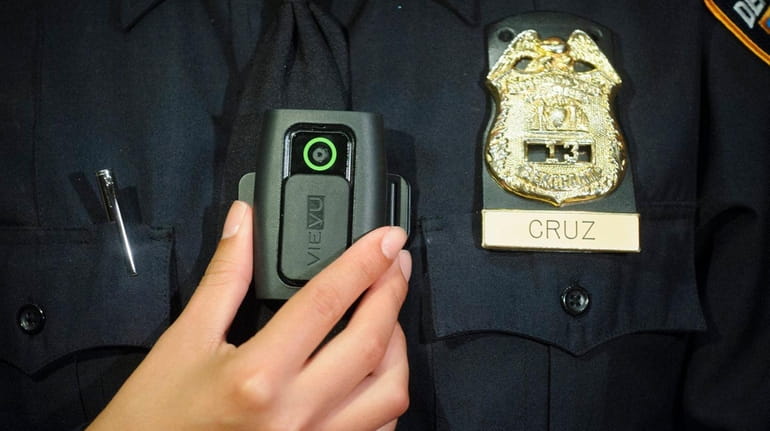Unions threaten legal action against proposed NYPD body camera rules

New York Police Department Sgt. Andrea Cruz wears the Vievu LE3 camera during a news conference at One Police Plaza on Sept. 4, 2014. The NYPD unveils rules for the use of the cameras and sets a timetable for a roll-out on April 7, 2017. Credit: Charles Eckert
The NYPD’s proposed rules on officers using body cameras, released Friday, quickly ran into a stiff head wind from some police unions that threatened imminent legal action to stop their implementation.
The proposals governing the use of body cameras, set to roll out at the end of the month in the 34th Precinct in Manhattan’s Washington Heights, would mandate changes in the Patrol Guide, the bible of police procedures.
Under the rules, officers would be required to tell members of the public they were being recorded — unless notification would impede an investigation or create a danger. The rules also spell out when police must record, such as during arrests or car stops, and should not record, such as victims of sexual abuse or informants.
The rules, which must be approved by a special federal court-appointed monitor and a federal judge, would govern this year’s rollout of body cameras for officers in 20 precincts, totaling about 1,000 to 1,200 officers.
But Friday the leaders of three major police unions, the Detectives Endowment Association, Lieutenants Benevolent Association and Captains Endowment Association, said they would be filing legal papers challenging the proposed rules. The Patrolmen’s Benevolent Association, as part of its contract settlement with New York City for its 22,000 members, recently agreed to back the camera program.
An NYPD spokesman said the department wasn’t aware of any legal actions being filed and the camera rollout would start as planned, assuming no injunction was issued.
Lou Turco, head of lieutenants union, said the proposed camera procedures would “have a drastic impact on the working conditions of my members.” He criticized the NYPD for negotiating the issue only with the patrolmen’s group.
Roy Richter, president of the captains union, said any changes governing recordings must be negotiated before asking police commanders to participate.
The prospect of legal action adds one more layer of complexity to an issue that surfaced in 2013 as a result of a ruling in a federal lawsuit over NYPD stop-and-frisk practices.

